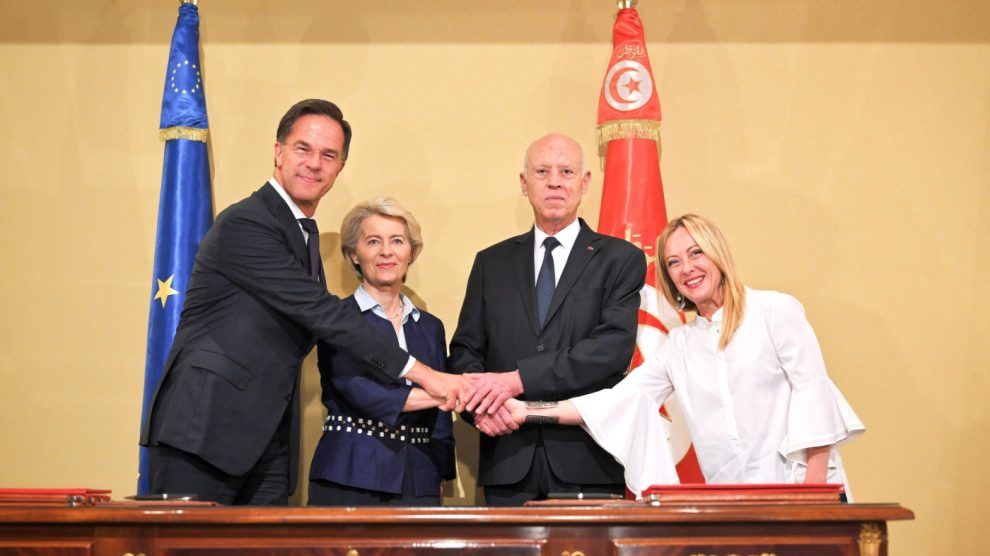We have a deal. On Sunday, the European Union and Tunisia signed a Memorandum of Understanding for a “comprehensive strategic partnership” encompassing illegal migration, economic development and energy. It entails financial aid – €105 million to contrast irregular migration and €150 million in budgetary aid, with the prospect of a long-term €900 million loan.
- European Commission President Ursula von der Leyen, who travelled to Tunis flanked by the Italian and Dutch PMs Giorgia Meloni and Mark Rutte, said the agreement was designed to “invest in shared prosperity.”
An Italy-heavy approach. Italian Prime Minister Giorgia Meloni, who has been pushing for a deal and spearheaded the European effort to that end, called the agreement an “important step to deal with the migration crisis in an integrated way” and a “new model” for building relations with North African countries.
- Her government is poised to present the so-called Mattei Plan, the framework for this kind of energy and investment-heavy cooperation, in October.
The expert’s take. Decode39 reached out to Lorena Stella Martini, national office assistant at the Rome office of the European Council on Foreign Relations. She highlighted the Italian PM’s drive to “be on the forefront as an interlocutor to Tunis” – as further demonstrated by upcoming Conference on Migration, to be held in Rome on July 23 with the participation of Tunisian President Kais Saied – and to “take the lead in Europe on migration and its external dimension” a key dossier for Italy, who managed to push its priorities up on the agenda of the whole EU.
Delving into the details. As for the deal in and of itself – “which is still an MoU that needs to be followed by binding agreements” – Ms Martini highlighted “the attempt at outlining a broad framework of cooperation aimed at structuring a deep and comprehensive partnership with the country in several domains.”
- This “should end up promoting sustainable development and unleashing the potential of the country’s population, thus ultimately contributing to curbing migration flows to Europe,” continued the expert.
- “What is concerning, however, is that this architecture, whose results will be collected in the medium-term, is paired with a much more direct and short-term attempt at stopping migration flows from Tunisia to Europe (namely Italy) along the Central Mediterranean route.”
The thorniest issue. As Ms Martini pointed out, the MoU states that Tunisia will only work to police its own borders, while all parties are “committed to cooperating to support the return of irregular migrants in Tunisia back to their country.” Given Europe’s previous experiences with this pattern of cooperation and Tunis’s track record on migration, “the compatibility between such a framework and the respect of migrants’ rights and dignity – again, as stated in the MoU – remains highly doubtful.”
- “What is more, Tunisia is currently heading towards default […] How could we possibly think that a country in such dire political and economic conditions could effectively and transparently deliver on this delicate dossier?”
Bottom line: “All in all, despite the will to outline a multidimensional partnership, the ‘pillar’ of migration within this MoU risks making the whole thing fall into a spiral of securitisation and weaponisation of migration flows once again,” concluded the ECFR expert, pointing out that President Saied has demonstrated his unreliability time and again.





